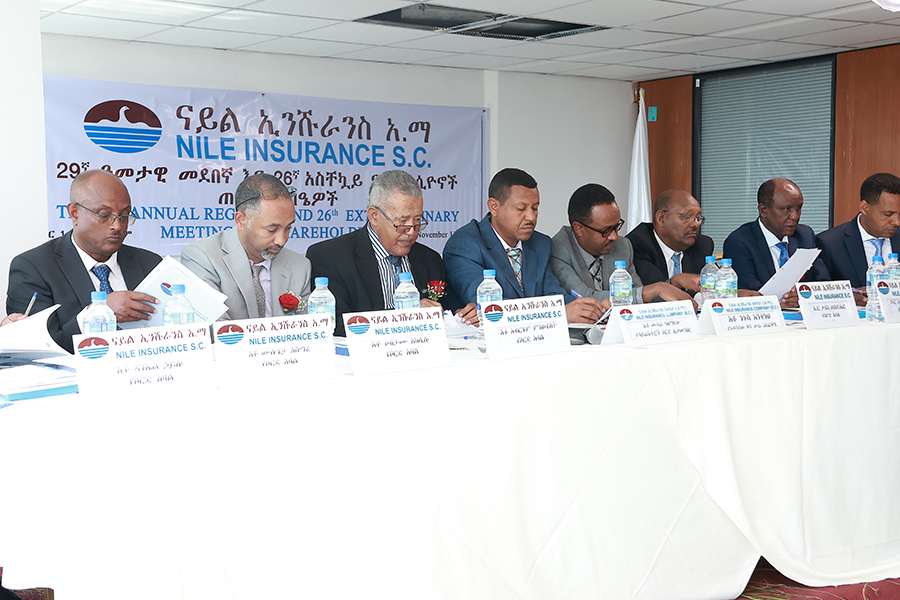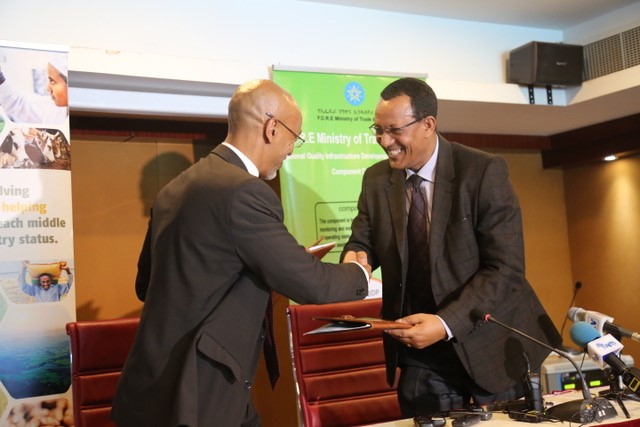
Viewpoints | Jul 18,2020
Jun 13 , 2020
By Fisseha Adugna
The GERD is an opportunity for the governments of Egypt and Ethiopia to come together through honest dialogue and mutual respect and understanding, rather than hostility and conflict, writes Fisseha Adugna, former ambassador of Ethiopia to the United Kingdom and Northern Ireland. The opinion reflected here is solely his own and not that of any institution or government.
Political tensions between Ethiopia and Egypt over the Grand Ethiopian Renaissance Dam (GERD) have recently intensified. Ethiopia has asserted its strict policy of non-harm to the Egyptian national interest and is pressing ahead with its plan to start testing and filling the Dam this summer. Egypt has argued that the GERD will deprive it of water from the Nile and has disseminated the argument widely, including to the Oval Office in Washington, DC.
In his recent article, "So Close, Yet So Far: An Account of the Negotiations on the Grand Ethiopian Renaissance Dam" in the Egypt Independentnewspaper, the legal counsel at the Egyptian Ministry of Foreign Affairs, Mohamed Helal (PhD), indicated many reasons why negotiations between Ethiopia and Egypt failed. Those reasons were misleading, insincere and concerning, and an indication of the stand of the Egyptian government.
His first argument was the safety of the Dam.
He said that Egypt is concerned, because the GERD has "serious flaws with the design specifications of the GERD, which cast doubt over the Dam's structural safety and stability."
It is, however, in the public domain that the GERD was designed and is under construction by Salini Imperegilo, a highly reputable international engineering firm that has completed 257 dams around the world.
"A system of three spillways safeguards the project … The different typology and location of the spillways introduces redundancy in the system, a key ingredient to guarantee the highest standard of hydrological safety," as international hydrological safety experts concluded with respect to the GERD in Hydro Review, an industry journal.
The second argument is that Ethiopia has not been transparent and did not share documents about the project with Sudan and Egypt.
"GERD was a closely guarded secret," said Helal. "Aside from the occasional leak in the local media, downstream states had virtually no knowledge of Ethiopia's plans to construct the GERD or of the size and design specifications of this dam."
That Ethiopia has been transparent in sharing data and technical information with downstream countries is a well-documented fact. The GERD was not and has not been a closely guarded secret, as evidenced by Ethiopia's efforts to build a coalition of all the countries that would benefit. Sudan signed on as a result of these efforts.
Not only did the Ethiopian government engage and share data with downstream countries, the GERD has been accessible from the beginning to any interested party including journalists from around the world.
Finally, Helal also asserts that Ethiopia's refusal to sign the Washington document prepared by the United States was driven by domestic political motivations given it is an election year in Ethiopia. He argues that Ethiopia is bound by the recent mediation efforts in the US from which Ethiopia withdrew.
In 2015, Ethiopia, Egypt and Sudan agreed on a practical framework for the resolution of disputes. That agreement addressed the prevention of significant harm in the use of Nile waters, dam safety, exchange of data and equitable and reasonable utilisation, among other things. This agreement does not authorise Egypt to unilaterally invite a third party to mediate disputes, which it tried to do through Washington.
Ethiopia demonstrated its goodwill and engaged in negotiations in Washington but negotiations failed because, as former US Ambassador to Ethiopia David Shinn said, "The United States seems to be putting its thumb on the scale in favour of Egypt."
The claim referencing "political expediency" during an election year in Ethiopia does shed light on Egypt's own deep-seated political ambitions on this topic. Egypt cannot hope to keep Nile riparian states in perpetual poverty by employing political tactics like divide and conquer and using media threats and diplomatic clout - this outcome is unacceptable in the long run. Recent intensification of counterproductive propaganda and one-sided diplomatic campaigns from the Egyptian government has damaged trust and confidence in this matter.
So what is the solution here?
There is a win-win solution. First, Egypt must cease its hostile propaganda and diplomatic campaign against Ethiopia. The Ethiopian government's intention is clear: to assert its right to utilise its water resources while preserving the interests of all riparian states consistent with relevant international law. The Egyptians and the Ethiopians are two people drinking from the same bountiful river.
The Nile is a shared resource that has and will continue to link the people of these two great nations together and can be used as an opportunity to shed light on the many things that Ethiopians and Egyptians have in common. The people of these two nations are brothers and sisters who share a destiny as two developing countries in Africa. They both are members of the African Union.
Relations between Ethiopia and Egypt have to build on these common assets not on the incorrect premise of a zero-sum game as we see today. The GERD is an opportunity for these two governments to come together through honest dialogue and mutual respect and understanding, rather than hostility and conflict. We should take heed to make this so.
There is yet a chance for tensions to be deescalated. The GERD does not arrest the flow of water to Sudan and Egypt. The sole objective of the GERD is to generate hydroelectric power that will transform the lives of millions of Ethiopians. It is a critical component of Ethiopia's strategy to fight poverty, first and foremost, by providing electric power for millions as well as addressing the country's need for electric power for her national economic development.
The GERD is a matter of survival for Ethiopia. At the same time, we have to make it clear that Ethiopia's plan to utilise its transboundary water resources is in strict adherence to the principles of international law on transboundary rivers - the principle of equitable utilisation and to not cause significant harm to downstream countries.
Let us look forward. Though badly damaged, the path to honest negotiations is still a possibility. The Camp David Agreement of the 1970s is a good example.
PUBLISHED ON
Jun 13,2020 [ VOL
21 , NO
1050]


Viewpoints | Jul 18,2020

Commentaries | Mar 04,2023

Viewpoints | Jul 27,2024

Radar | Sep 23,2023

Commentaries | Aug 22,2020

Viewpoints | Nov 13,2021

Viewpoints | Mar 21,2020

Radar | Nov 11,2023

Radar | Aug 25,2024

Fortune News | Jun 23,2019

Photo Gallery | 170371 Views | May 06,2019

Photo Gallery | 160608 Views | Apr 26,2019

Photo Gallery | 150244 Views | Oct 06,2021

My Opinion | 136246 Views | Aug 14,2021





Dec 22 , 2024 . By TIZITA SHEWAFERAW
Charged with transforming colossal state-owned enterprises into modern and competitiv...

Aug 18 , 2024 . By AKSAH ITALO
Although predictable Yonas Zerihun's job in the ride-hailing service is not immune to...

Jul 28 , 2024 . By TIZITA SHEWAFERAW
Unhabitual, perhaps too many, Samuel Gebreyohannes, 38, used to occasionally enjoy a couple of beers at breakfast. However, he recently swit...

Jul 13 , 2024 . By AKSAH ITALO
Investors who rely on tractors, trucks, and field vehicles for commuting, transporting commodities, and f...

Oct 4 , 2025
Eyob Tekalegn (PhD) had been in the Governor's chair for only weeks when, on Septembe...

Sep 27 , 2025
Four years into an experiment with “shock therapy” in education, the national moo...

Sep 20 , 2025
Getachew Reda's return to the national stage was always going to stir attention. Once...

Sep 13 , 2025
At its launch in Nairobi two years ago, the Africa Climate Summit was billed as the f...

Oct 5 , 2025 . By NAHOM AYELE
In Meqelle, a name long associated with industrial grit and regional pride is undergo...

Oct 5 , 2025 . By BEZAWIT HULUAGER
The federal government is set to roll out a new "motor vehicle circulation tax" in th...

Oct 5 , 2025 . By NAHOM AYELE
The Bank of Abyssinia is wrestling with the loss of a prime plot of land once leased...

Oct 5 , 2025 . By BEZAWIT HULUAGER
The Customs Commission has introduced new tariffs on a wide range of imported goods i...